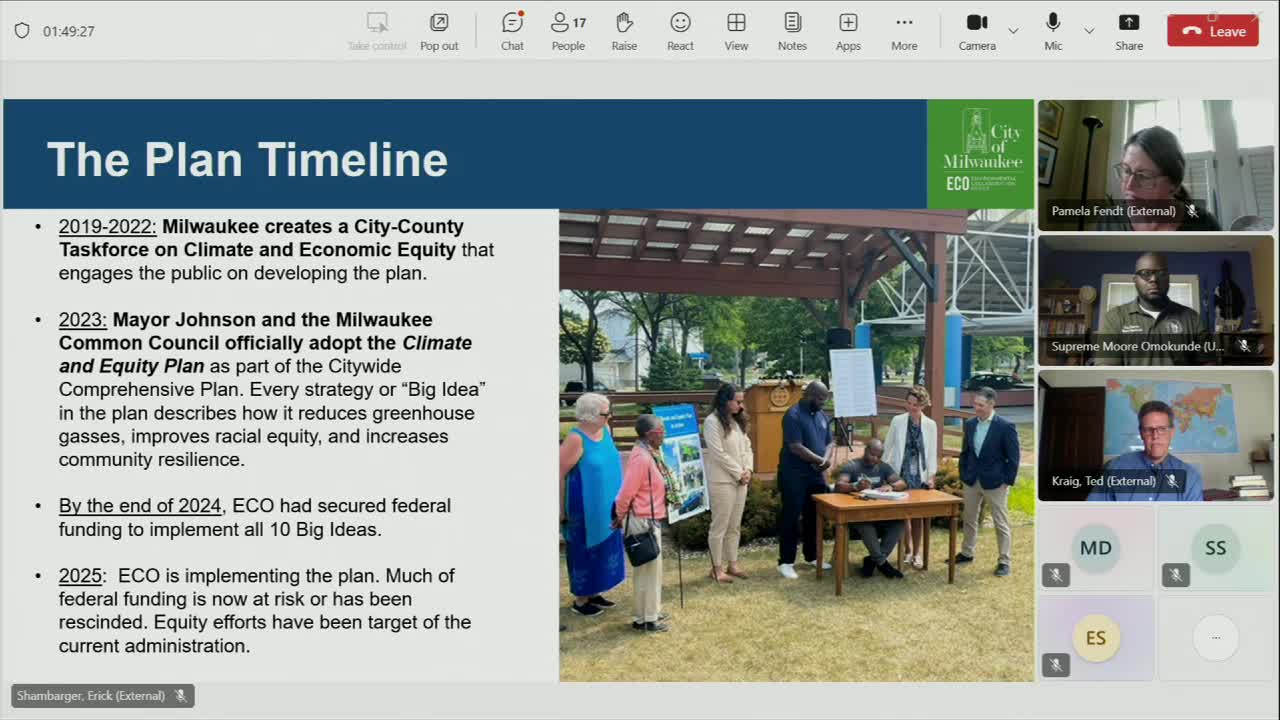Milwaukee Expands Green Job Initiatives Despite Federal Funding Setbacks
July 16, 2025 | Milwaukee County, Wisconsin
This article was created by AI summarizing key points discussed. AI makes mistakes, so for full details and context, please refer to the video of the full meeting. Please report any errors so we can fix them. Report an error »

The Milwaukee County - City-County Advisory Board on Climate and Economic Equity convened on July 16, 2025, to discuss ongoing initiatives and challenges related to climate action and economic equity. The meeting, held in Room 203-R and live-streamed for public access, highlighted significant developments and concerns regarding federal funding and local projects aimed at promoting green jobs and sustainable practices.
The discussion opened with a focus on the precarious status of federal funding, which has faced rescindment and risks under the current administration. Despite these challenges, board members emphasized their commitment to advancing both equity and emissions reduction goals. A key initiative, the Green Jobs Accelerator, aims to create inclusive job pathways for people of color in emerging green sectors. The board reported the hiring of a Green Jobs Coordinator and the launch of an updated Green Jobs website, which connects job seekers with training providers and employers.
The meeting also addressed the importance of community benefits agreements in federal grants, although uncertainty looms due to recent executive orders questioning their viability. The board is actively pursuing these agreements, particularly for an electric vehicle charging grant. Additionally, a new pre-apprenticeship program for arborists has been established, enhancing entry-level opportunities in the forestry sector.
Upcoming events were announced, including a week-long Bluegreen Jobs Career Exploration event, "Waves of Change," designed for youth aged 14 to 24. Participants will explore careers in civil engineering, water quality, and trades related to water treatment, with stipends provided for attendance.
In terms of home upgrades, the board reported on efforts to promote federal incentives for energy efficiency improvements. Despite setbacks, including the rescindment of a $1 million EPA grant, a new $2 million HUD grant has been secured to support healthy home upgrades alongside energy efficiency initiatives.
The meeting also covered the implementation of commercial building performance standards, with the first reporting deadline approaching. The board expressed optimism about recent updates to the state's commercial building energy codes, which had faced legal challenges but are now set for revision.
Transportation initiatives were highlighted, including the successful expansion of protected bike lanes and the adoption of Vision Zero policies aimed at reducing reckless driving. However, challenges remain, such as fiscal issues faced by the Milwaukee County Transit System and the cancellation of a significant federal project.
The board concluded with a discussion on greening the electric grid, noting the completion of a solar project that powers city buildings with renewable energy. Despite the positive developments, concerns were raised about rising energy use due to data centers and increased investments in natural gas facilities.
Overall, the meeting underscored the board's ongoing efforts to navigate funding challenges while advancing climate and equity goals. The next steps include continued advocacy for federal support and the implementation of local initiatives aimed at fostering a sustainable and equitable future for Milwaukee County.
The discussion opened with a focus on the precarious status of federal funding, which has faced rescindment and risks under the current administration. Despite these challenges, board members emphasized their commitment to advancing both equity and emissions reduction goals. A key initiative, the Green Jobs Accelerator, aims to create inclusive job pathways for people of color in emerging green sectors. The board reported the hiring of a Green Jobs Coordinator and the launch of an updated Green Jobs website, which connects job seekers with training providers and employers.
The meeting also addressed the importance of community benefits agreements in federal grants, although uncertainty looms due to recent executive orders questioning their viability. The board is actively pursuing these agreements, particularly for an electric vehicle charging grant. Additionally, a new pre-apprenticeship program for arborists has been established, enhancing entry-level opportunities in the forestry sector.
Upcoming events were announced, including a week-long Bluegreen Jobs Career Exploration event, "Waves of Change," designed for youth aged 14 to 24. Participants will explore careers in civil engineering, water quality, and trades related to water treatment, with stipends provided for attendance.
In terms of home upgrades, the board reported on efforts to promote federal incentives for energy efficiency improvements. Despite setbacks, including the rescindment of a $1 million EPA grant, a new $2 million HUD grant has been secured to support healthy home upgrades alongside energy efficiency initiatives.
The meeting also covered the implementation of commercial building performance standards, with the first reporting deadline approaching. The board expressed optimism about recent updates to the state's commercial building energy codes, which had faced legal challenges but are now set for revision.
Transportation initiatives were highlighted, including the successful expansion of protected bike lanes and the adoption of Vision Zero policies aimed at reducing reckless driving. However, challenges remain, such as fiscal issues faced by the Milwaukee County Transit System and the cancellation of a significant federal project.
The board concluded with a discussion on greening the electric grid, noting the completion of a solar project that powers city buildings with renewable energy. Despite the positive developments, concerns were raised about rising energy use due to data centers and increased investments in natural gas facilities.
Overall, the meeting underscored the board's ongoing efforts to navigate funding challenges while advancing climate and equity goals. The next steps include continued advocacy for federal support and the implementation of local initiatives aimed at fostering a sustainable and equitable future for Milwaukee County.
View full meeting
This article is based on a recent meeting—watch the full video and explore the complete transcript for deeper insights into the discussion.
View full meeting
